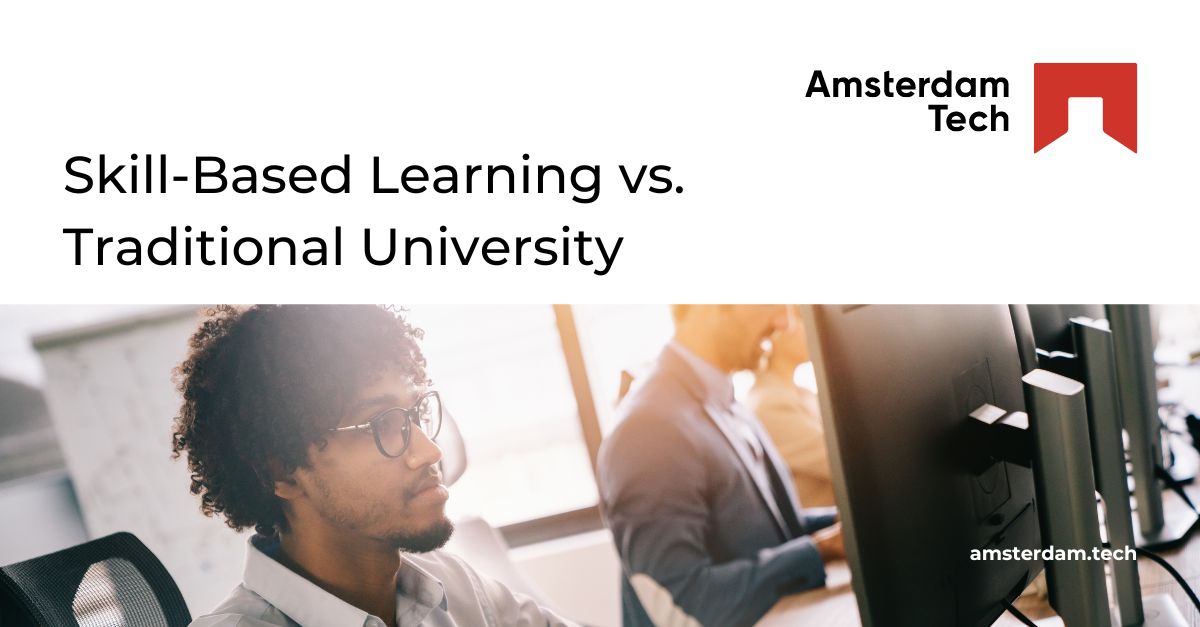
Skill-Based Learning vs. Traditional University
In today’s rapidly evolving world, the traditional approach to education is being challenged by alternative models that prioritize practical skills and real-world experience. One such model gaining traction is skill-based learning, which focuses on equipping individuals with the specific skills needed to thrive in their chosen field. In contrast, traditional universities often offer a broad range of subjects and emphasize theoretical knowledge over practical application. To shed light on the differences between these two approaches, let’s delve into a detailed comparison.
Skill-Based Learning: A Path to Practical Proficiency
Skill-based learning, exemplified by programs like those offered at institutions such as Amsterdam Tech, emphasizes hands-on experience and project-based learning. Instead of traditional lectures, students engage in collaborative projects and learn from their peers. This approach fosters a dynamic learning environment where students actively solve problems and develop practical skills relevant to their chosen industry.
One notable aspect of skill-based learning is its focus on employability. By honing specific skills demanded by employers, students are better prepared to enter the workforce upon completion of their program. This targeted approach ensures that graduates are equipped to tackle real-world challenges from day one, making them highly desirable candidates in today’s competitive job market.
Traditional University Education: A Broad Foundation
Traditional universities, on the other hand, offer a more generalized education encompassing a wide range of subjects. While this approach provides students with a broad foundation of knowledge, it may lack the specificity and practicality offered by skill-based programs. Students often study subjects unrelated to their intended career path, leading to a longer time to acquire relevant skills and potentially delaying entry into the workforce.
Furthermore, traditional university education typically relies heavily on classroom-based learning, where students passively receive information from instructors. While this method has its merits, it may not adequately prepare students for the realities of the working world, where problem-solving and collaboration are paramount.
Key Differences: Focus and Approach
The primary difference between skill-based learning and traditional university education lies in their focus and approach. Skill-based programs prioritize practical skills and real-world experience, while traditional universities offer a broader, more theoretical education. Additionally, skill-based learning often involves peer collaboration and project-based assignments, fostering a more hands-on learning experience compared to traditional classroom lectures.

The Importance of Peer Learning
A noteworthy aspect of skill-based learning is its emphasis on peer learning. Collaborating with peers allows students to learn from each other’s experiences and perspectives, fostering a collaborative and supportive learning environment. Peer learning encourages active engagement and problem-solving, essential skills for success in today’s dynamic workplaces.
The Future of Education
As technology continues to reshape industries and job markets, the demand for practical, job-ready skills is on the rise. Skill-based learning programs offer a viable alternative to traditional university education, providing students with the specific skills needed to excel in their chosen field. By embracing a hands-on, project-based approach, these programs prepare graduates to hit the ground running in today’s fast-paced world.
In conclusion, while both skill-based learning and traditional university education have their merits, the choice between them ultimately depends on individual preferences and career goals. Whether opting for a specialized skill-based program or pursuing a traditional degree, the key is to choose an educational path that aligns with one’s aspirations and equips them for success in the ever-evolving landscape of work and learning.
